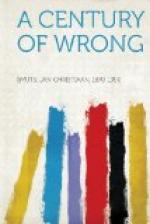The imaginary nature of these grievances is not dispelled by the fact that the power is vested in the State President of prohibiting either entirely or provisionally the circulation of any printed matter which is contrary to good morals or public order, because the very same Supreme Court, which in the opinion of Her Majesty’s Government only exists at the mercy of this Government, has pronounced that it has no power to prohibit the circulation of any newspaper; the freedom of the regular Press thus remains as unrestricted as under the old Grondwet.
As a matter of fact, any person who has any practical experience of the Press of this Republic will regard the accusation as ridiculous, and as evincing an entire ignorance of the true facts. This power has not been exercised by the Judges on many occasions, but only once, and in that instance the High Court annulled the decision.
With regard to the Aliens Expulsion Law, this, like the Press Law, ought to be estimated according to its spirit and operation. Since this law has come into force the State President has only on one occasion made use of the power vested in him of expelling an undesirable individual, and his action was endorsed by the approval of the Press and the public of the country. As similar laws exist in nearly every civilised country in the world, it is difficult to see why such a law in this Republic should prove so objectionable in the eyes of Her Majesty’s Government.
With regard to Law No. 1 of 1897, and the dismissal of Chief Justice Kotze by virtue of its provisions, this Government can only state that it was with the bitterest regret that it felt itself compelled, in consequence of the arbitrary action of the said Chief Justice, to take comprehensive measures in order to prevent absolute constitutional and judicial disorder and chaos. It was an instance where a Chief Justice in conflict with a law existing for, at least, forty years, and in direct contradiction of his own decisions, suddenly adopted and applied a new principle, which affected the legality of the laws of the Republic, and produced real constitutional chaos. Would not any other Government under similar circumstances have done exactly what this Republic did, namely, pass a special law in this unusual case, in order to remove the exceptional difficulties?
This law was only applicable to this particular instance, and became inoperative immediately after its application; and this Government cannot understand how suspicion can therefore fall upon the impartial administration of Justice in this Republic. If the Government had acquiesced in the position taken up by the late Chief Justice, then all titles dependent upon Volksraad resolutions would have been called in question, which would not only have dealt a heavy blow to existing rights, but also have plunged the administration of Justice in great uncertainty and doubt.
By this law the Judges, instead of being brought under the influence of the Executive Council, were really placed in the same constitutional position as any Judge in the Supreme Court of England, who is unable to question the validity of any law.




